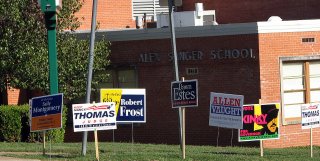
In a blog entry over two years ago, I said that only two kinds of people are in favor of electronic or computerized voting machines: people who are selling electronic or computerized voting machines; and people who know nothing about computers. I was wrong. There are three types of people who favor these devices: the two I just mentioned, and a third group - people who don't understand democracy.
Computerized voting machines are not inherently safer than traditional paper ballots, any more than your digital photo collection is safer than the old photos you've got in boxes. Nor are computerized voting machines inherently more secure. The old folks who volunteer as poll workers may not understand what it would take to commit fraud with computers, but that hardly means it's not possible, and poll workers do understand that. Voters do, too.
And that is the nub of the problem. Ordinary voters know that they do not know how computerized voting works, how secure it is, and so on. What voters cannot know, they cannot trust, and if voters cannot and do not trust the voting process - trust it not in their brains but in their bones - then our democracy is in deep trouble.
If you have ever volunteered to be a poll worker in an election, you probably have a pretty decent idea what would be involved in committing fraud with the ballots. You know that it's not impossible, but it's not easy - and it would be pretty tricky to keep your fraud a secret. You know that it's possible to audit the ballots - counting actual ballots from the box and comparing the count to the number of signatures in the poll register that voters sign. Even blind voters can put their hands on these things and feel them, and normal sighted voters can see all this with their own eyes. But computerized voting machines make the entire process invisible. You click a button for candidate X and trust that it counts as 1 vote, but there's no obvious way for you to know.
There's nothing that can be done about this. Making the machines "more secure" the way I try to make my client's databases more secure is not the answer. It is not enough for the county precinct chairman - or rather, the IT advisors to the county precinct chairmen - to trust the machines. That's almost irrelevant, like the question of whether the referees thought the game was called fairly or not. What matters is whether the voters trust the machines, and there is no way they ever can or will. Machines may provide printed receipts, but these receipts are almost comical. For the receipts to be trustworthy, you'd have to expect voters to review the receipt before committing or submitting their selections. After the voter leaves the polling place, the receipt is worthless, unless, of course, we eliminate anonymous voting and start tying individual ballot records in the voting database to known voters. If you're going to ask voters to review a printed ballot prior to clicking the "Submit Ballot" button, why not skip the expensive middleman and just give the voter a paper ballot to start with?
The only thing that computerized voting machines have going for them is speed. But it is far more important that elections be fair and trustworthy than that the poll results be posted in time for the ten o'clock news the same day. It would do our democracy some good, in fact, for people to be told to sit and wait for a day to find out who won.
No election is ever perfect. But voters trust traditional ballots because they know that large scale accidents are unlikely. But even computer-savvy voters can't know this about computerized voting machines.

